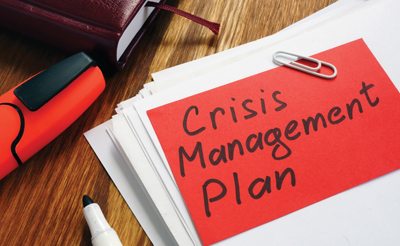
Coronavirus Plans and Precautions for Proactive Community Associations
By Evonne Andris / Published May 2020

Editor’s Note: Since this article was written the situation has continued to evolve. Please visit cdc.gov for the most current information.
In March 2, 2020, York Condominium Corporation of Ontario, Canada, advised its residents that one of its security guards, who had traveled overseas, had been diagnosed with COVID-19. For the residents of the community involved in this case and all those who reside or work in community associations, chatting and interacting with one’s fellow neighbors and association staff can be one of the greatest joys of condominium or community living.
However, being in proximity with others is also the most typical pathway to contagion when infectious diseases such as the deadly COVID-19 coronavirus are circulating. In response to the expected rise in COVID-19 cases, now is the time for associations to dust off and review their emergency plans and implement some important precautions.
To protect against catching and spreading COVID-19, the Centers for Disease Control and Prevention recommends washing hands frequently with soap and water for at least 20 seconds, especially after going to the bathroom, before eating, and after blowing your nose, coughing, or sneezing. If soap and water are unavailable, use an alcohol-based hand sanitizer with at least 60 percent alcohol. It is also recommended to avoid close contact with people who are sick, and stay home when you are sick.
Community associations should take a proactive approach toward preparing for the potential spread of COVID-19. Associations should consider installing and using hand sanitizer dispensers in high-traffic areas, including the lobby, management office, meeting rooms, social rooms, dining halls, package rooms, fitness center, and elevator vestibules. They should also focus on upgraded cleaning measures and protocols to help ensure that high-touch surfaces, including lobby reception desks, elevator buttons, handrails, and door handles, are being cleaned and sanitized on a regular and frequent basis. Common-area restrooms should be cleaned and inspected with frequency, and special attention should be given to refilling all essentials, such as soap and towel dispensers.
Any residents, contractors, vendors, or employees who show signs of a respiratory illness, such as coughing, chest congestion, runny nose, and/or fever, should avoid contact with others as much as possible. According to the CDC, individuals should stay home until they are free of fever (100.4° F [37.8° C] or greater using an oral thermometer) and any other symptoms for at least 72 hours without the use of fever-reducing or other symptom-altering medicines. Those who appear to have a fever or acute respiratory illness symptoms either while working at the association property or residing within the community should be separated from other employees and residents, and they should be immediately sent to their home or unit. Additionally, the local county health department should be contacted. Residents, employees, vendors, and contractors should be instructed to cover their noses and mouths with a tissue when coughing or sneezing (or an elbow or shoulder if no tissue is available).
If absenteeism of essential association management and on-site personnel becomes an issue, associations may need to cross-train healthy staff members to perform essential functions and perhaps even consider asking for volunteers among healthy residents to lend a hand. To that end, it is important for essential association management and personnel to detail and keep accurate records of the contact numbers and information necessary for the continuing business of the association. Additionally, associations may want to consider establishing remote connections or communication protocols so essential association management can work remotely, if able.
All these measures, including the recommended advice for handwashing and personal hygiene, should be communicated by associations to their unit owners, residents, and staff. These communications may come in the form of a letter or email along with online notices on association websites and on-site postings in clubhouses, fitness centers, and meeting rooms. The letter should note that the property is dedicated to helping residents and staff avoid catching and spreading COVID-19 and other contagious diseases, and it is asking for everyone’s help in following all the personal hygiene guidelines and precautions recommended by the experts.
If an outbreak within a community should occur, associations may want to consider hiring professional emergency response contractors to clean and sanitize the common areas.
As the spread of the COVID-19 coronavirus unfolds during the coming weeks, community associations that take the initiative to develop and implement a coordinated response will gain the upper hand in their efforts to help keep the exposure of their residents and staff as low as possible.
Evonne Andris
Shareholder, Siegfried Rivera
Evonne Andris is a shareholder with the South Florida law firm Siegfried Rivera and is based at the firm’s Broward County office. She focuses on community association law and is a contributor to the firm’s association blog, www.FloridaHOALawyerBlog.com. The firm also maintains offices in Miami-Dade and Palm Beach counties, and its attorneys focus on community association, construction, real estate, and insurance law. For more information, visit www.SiegfriedRivera.com or call (305) 442-3334.





